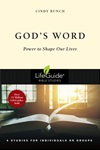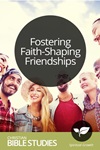Seattle has its own smaller version of the Statue of Liberty. She gazes over Puget Sound, standing tall in a park that swarms with joggers and parents pushing strollers. From the rear she looks just like the statue in New York City with flowing robes, a torch in her hand, and a crown with spikes. Her face, however, is totally different. While Lady Liberty in New York has a stern and austere expression, Seattle's near replica has a soft, almost fleshy face. She looks like an indulgent grandmother.
I've always loved the "real" Statue of Liberty, including her stern expression. Standing in New York harbor as a symbol of welcome to those in need, Lady Liberty's face reminds me that freedom is costly, requiring sacrifice, discipline and commitment.
We live in a culture obsessed with freedom and liberty, but our version of liberty has become indulgent and soft, like the face on Seattle's statue. We forget that freedom comes at a price; we act as if liberty means the right to be self-absorbed and self-focused.
While we skim from one enticing and absorbing topic to another— beauty aids and sex techniques, cell-phone calling plans and personal organizers, exercise shoes and kitchen remodels—we barely notice that these thoughts take the place of other concerns we value more highly. We so easily become enslaved to things that ultimately have little meaning.
Here's the rub: we inhabit a culture obsessed with liberty, but we habituate ourselves into bondage. We've forgotten what lack feels like and what liberty tastes like.
An Invitation
Jesus Christ has redeemed us from the power of sin and death so we can live in freedom. Jesus said to his disciples, "If the Son makes you free, you will be free indeed" (John 8:36). The apostle Paul echoed that wonderful truth: "The law of the Spirit of life in Christ Jesus has set you free from the law of sin and of death" (Rom 8:2). How can we experience more of that liberty in our everyday lives?
Fasting, an ancient practice, encourages us to grow in true freedom. In fasting, God invites us to experience the kind of freedom that is rooted in healthy discipline and meaningful sacrifice, the kind of freedom that reflects the awesome reality that we have been freed from sin and death. Fasting offers the opportunity to step back from our culture and cross the doorway into God's presence. Fasting ushers us into a reflective place where we can listen to God and pray wholeheartedly for things that really matter.
Christians today are embracing fasting in a variety of forms. This discipline addresses some of the challenges of trying to live faithfully in a frantic and materialistic consumer culture. Fasting today includes abstaining from food, just like Christians did centuries ago, but also from news media, entertainment, information, shopping, email and the Internet, and other aspects of daily life.
I was praying for the thousandth time about an obstacle a friend had been facing for almost two years—something that should have been resolved much more quickly. As I was praying, the idea came into my mind that perhaps we should fast together as we prayed for the problem. My friend agreed, and we set a date for a one-day fast.
I prayed about how to fast on that day. As I looked at my schedule, I found I had three consecutive appointments that would require a total of four car trips ranging from 15 to 30 minutes each. When I drive I always play music, turned up loud. I decided to fast from music on those four car rides, expecting that the silence would remind me to pray. So on that pleasant sunny day I set out on my first expedition with the car windows open. I noticed something surprising right away: my muffler was beginning to go out! I hadn't noticed it earlier because of the music I always play. I wondered what else I might be missing in my life because I do so many things the same way, day after day.
On the first two trips, the shorter ones, I prayed fervently for my preferred solution to my friend's problem. On the third trip, I realized I had spent no time trying to hear God's voice on the subject, so 1 began to ask God to teach me how to pray for the problem. I found myself thanking God for the ways he has helped my friend cope and for the ways he has brought good things to her because of this unresolved issue. Then my prayers changed again, and I began to focus on her family. By the fourth car trip, I was praying for the problem in a totally different way and this new way of praying continued to influence my prayers after the fast day ended.
On the two longer car trips, I didn't pray continuously. My thoughts would drift off to other things. But, as I expected, the absence of music, the hum of traffic and the roar of my muffler reminded me numerous times that I had committed myself to pray while I drove.
This form of fasting communicates a profound freedom. I don't have to do things the same way, day after day. I am not a slave to my habits. I can change things around, I can try new things, and I can experience companionship with God in new ways. I am free to lightheartedly stop a habit for a day and experience new things with God, even as my heart is heavy and I am praying fervently for my friend's needs.
Freedom, not self-punishment
As I write about many specific issues related to fasting, I want to argue that fasting is essentially about freedom: The freedom to make time to read the Bible and draw near to God. The freedom to pray passionately for the needs of people near and far. The freedom to listen to God and change the direction of our prayers. The freedom to feel the full range of human emotions mirrored so passionately in the Psalms. The freedom to embrace a rhythm that includes days and weeks of ordinary everyday consumption of food and entertainment, days of fasting, and great celebrations of feasting, when we eat special foods and indulge in favorite activities.
Linda, a medical assistant who was raised in a Roman Catholic family, remembers the Fridays of her childhood, when her family ate macaroni and cheese or Tuna Helper instead of meat. She reflects, "Fasting in my childhood was about self-punishment because we are sinful." She does not fast today because she doesn't believe God wants us to punish ourselves. Linda is right that God doesn't want us to punish ourselves. Fasting as self-punishment denies the freedom God gives us in Christ. Fasting as self-punishment does not create space for prayer, give energy to our prayers or enable us to listen to God.
Jodie, an office manager in her 50s, echoes the theme of self-punishment, taking it even further. She is adamant that "not eating is not good." She cannot see any way that fasting could he a healthy spiritual discipline. Fasting, Jodie says, runs the risk of being theologically or spiritually abusive. It surely calls on the perceived dichotomy between body and soul, physical and spiritual, as if there can be no integration, no unity, no fullness of self. I find that worldview to be a denial of God's good creation, and one that has caused innumerable problems for Christians over the years. Deny the body. Deny the appetites. Don't have fun. Of course, the other side—indulge to excess—is equally spiritually bankrupt and self-destructive. We are a part of creation, and our bodies and appetites are a part of creation. We should rejoice in that, not deny and reject it. Our spirits are intimately connected to our bodies, and to deny the latter is to cripple the former.
Jodie is right that indulgence to excess is spiritually bankrupt and self-destructive. If we listen to our culture, encouragement to indulge to excess is all we hear. Fasting provides times to back away from excess in order to pray. In that backing away and in that praying, we often rediscover a healthier pathway for everyday life.
Fasting is not about practicing extreme self-denial day after day, year after year. Fasting lasts only for a set time. When we fast, we affirm that we are healthiest when we embrace rhythms. Sometimes we need to celebrate abundance; sometimes we need to submit ourselves to discipline.
Jodie believes that fasting denies the relationship between the body and spirit. I would say in response that if we do it well, fasting more than any other spiritual discipline affirms the integral relationship between body and soul and spirit. It helps us steer a path between unhealthy self-indulgence and excessive discipline. The key to healthy fasting is to understand the purpose of spiritual disciplines.
Everyday Disciplines and Spiritual Disciplines
We engage in any kind of discipline because we believe our lives are shaped by the habits we engage in every day. I take out the garbage so the house doesn't smell. I balance the checkbook to make sure I have money in my account. I exercise regularly so my blood pressure and other health indicators will slay at healthy levels and so I can sleep well at night. All of us engage in countless small disciplines that make our lives work well.
We can take habits too far or not far enough. I could choose not to exercise at all. When I do that, I stop sleeping well, I gain weight and my health suffers. Or I could exercise all the time until it becomes a compulsion and I can't think of anything else. That would be equally destructive. Instead, I've tried to figure out the right amount of exercise for my body. In the same way, I could check my bank balance every day or not at all. Instead, I try to track money in a way that keeps my spending wise and under control but doesn't allow me to become obsessed.
Spiritual disciplines are similar. We have a lifetime to explore the spiritual disciplines and figure out what works best for us, what helps us draw near to Jesus and grow in faith. What works at one stage of life may not be so effective at another stage, so we need to try new things from time to time. At all stages of life, we can fall into excess very easily. We can ignore the disciplines that might help us grow in faith, or we can become obsessed with them and go too far.
Tony Jones, in his helpful book The Sacred Way, writes, "The goal of Christian spirituality is to he enlivened by God's Spirit." He goes on to affirm that the words practice and discipline are helpful terms to consider when discussing what Christian spirituality looks like in everyday life. Since ancient times, Christians have understood that everyday spirituality thrives because of the spiritual practices or disciplines we engage in day after day and week after week. Some of those practices are what Jones calls "contemplative," including spiritual direction, many kinds of prayer and sacred reading of Scripture. Other practices, such as fasting, engage the body directly. Jones recommends that we imagine the parallels between the Christian life and learning to play a musical instrument or working out in a committed way or improving at playing chess. Just as discipline and practice are essential in each of those endeavors, so discipline and practice are equally essential in growing close to God in Jesus Christ, allowing God's Spirit to enliven us.
As we explore the discipline of fasting, we don't engage in spiritual practices or disciplines to punish ourselves. John Piper, author of many books on desiring God, is adamant that Christian fasting rests on the finished work of the Bridegroom, Jesus, who has bought our salvation by his death. The Holy Spirit is a pledge of our inheritance (Eph. 1:13–14). Jesus' love arouses in us a hunger for the fullness of God's presence in us and with us. Fasting expresses that hunger.
Christian fasting is simply not about self-punishment, as Linda experienced in her childhood. Jesus redeemed us; any punishment we deserve belongs in the past. Jodie observed that self-deprivation seems rooted in self-hate. When I stop enjoyable activities in order to take out the garbage, balance the checkbook or exercise, I'm not engaging in self-deprivation because I hate myself; I do these small acts of discipline because I want to take care of the precious life God has given me. In the same way I embrace fasting as a way to affirm my desire for God's presence.
I love that amusing memory of the day I fasted from music in the car to pray for my friend's need. The first thing I noticed was the unexpected noise of my failing muffler. To some extent, fasting is just that simple. We remove something habitual so we can experience something new. We long for the fullness of God's presence, so we remove something from our life for a season in order to get a glimpse of God, through prayer, in a new way. Fasting gives us the freedom to do that.
Christian fasting, when it is done in a biblical and spiritually healthy way, is not a way of avoiding life, as Jodie believes. Fasting is a way of experiencing something new in life. Our appetites are a part of creation, just as Jodie says. But we can discipline some of our appetites for a time in order to embrace other appetites, particularly our desire for intimacy with God through prayer. Bring your longings and fears about fasting to God in prayer. Bring questions about fasting to God. Ask God to open your heart to hear his guidance.
Excerpted from Fasting, by Lynne M Baab (IVPress), used with permission.












